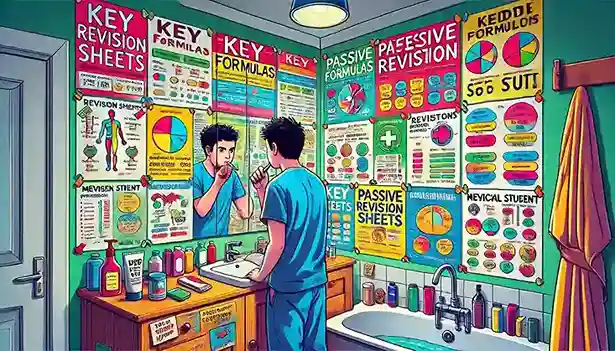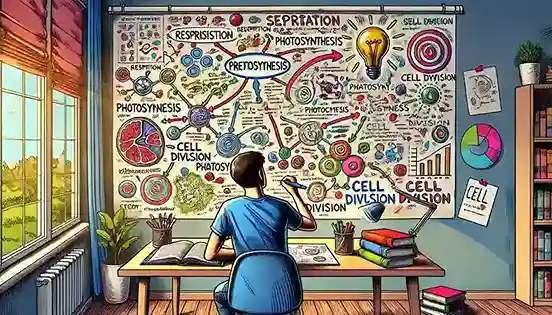NEET Important Concepts: How to Remember Them?
Hello, future doctors! The problem with the NEET Syllabus is that it is extremely vast. Understanding the concepts is one battle and remembering all of them is an entirely different one.
It is very frustrating to realise that you’ve forgotten what you’ve spent hours learning. So we tend to cram everything up to revise it. But the secret is- there are other ways to revise NEET concepts. It’s about studying smart, not just hard.
Let’s explore these strategies that are easy to follow, fun, and proven to work!
1. Actively engage with the material.

If you’re reading and re-reading your notes, stop right now. Passive reading doesn’t work for long-term retention. Who knows if you’re actually understanding what you read or just going through it for the sake of it.
Switch to active recall. In this technique, you will test yourself on the material.
After reading a topic, close your book and try to recall as much as possible. Write it down or say it out loud. If you get stuck, go back and review, then try recalling again.
Example: After studying the structure of the heart, draw and label it from memory instead of just staring at the diagram for 10 minutes.
2. Repetition with Revision Sheets
This is my favourite method of revision that has worked for me even in MBBS.
Create concise revision sheets with physics formulas, important biology dates and examples, difficult concepts illustrated in short and chemistry reactions. These sheets should be personalised, including the stuff that you keep forgetting.
Make them pretty, use colors and diagrams. The goal is to have everything important on a single glance-worthy page.

Lastly, Laminate these sheets and stick them on surfaces you see often—your cupboard, bathroom mirrors, dining tables, or beside your bed. Then everytime you walk past these places, glance at the sheets and make sure you know the material.
This method demands no ‘extra time’ and helps you retain everything for a very long time.
3. Integrate Concepts Into Your Routine
Similar to the revision sheet method, you can also have revision pdfs. Your study routine should allow for revision without feeling like an extra burden.

Save your revision sheets as PDFs on your phone. Use your travel time or waiting times to go through them.
Spend 10 minutes every night going over topics you struggled with that week. Sleep helps consolidate memory, so this practice is especially effective.
4. Mock Tests
Mock tests are a great way to understand the gaps in your memory and to know where you need to focus your attention.

Attempt topic-wise mocks regularly, analyze your mistakes using the ‘Tally Sheet’ method, and focus on the chapters where you struggled.
The tally sheet will help you identify weak areas. You can then revisit those concepts immediately.
5. Use Mnemonics and Memory Tricks
Biology consists of facts and examples. So, most of biology is just memorization. Mnemonics make memorization much easier. You can find biology mnemonics on Youtube at ‘Ozone Classes by Vipin Sharma Sir’
- Example:
- For taxonomy: “King Philip Came Over For Good Soup” (Kingdom, Phylum, Class, Order, Family, Genus, Species).
- For electromagnetic spectrum: “Roman Men Invented Very Unusual X-ray Guns” (Radio, Micro, Infrared, Visible, UV, X-ray, Gamma).

These are very common examples. You can go to youtube or also create your own silly mnemonics that resonate with you. They’re often the most memorable.
6. Teach to Retain
Teaching someone else is one of the most effective ways to solidify your understanding. Even if it’s just your sibling, a friend, or your wall, explaining concepts out loud forces your brain to organize and clarify information.
Practice teaching physics or chemistry concepts to someone. If you can explain it simply, you’ve truly understood it.

7. Mind Maps and Visual Flowcharts
If you do not have someone to teach then you can use this method. Close the book, try to recall all the information and make flowcharts and mind maps.
After you’re done, cross check with the book for anything that’s been left out. Use this completed mind map to then revise the topic later on.
It helps you know the gaps in your understanding and also create material that you can use for reference later.
Pro Tip: Hang your favorite mind maps on walls or keep them in a handy folder for quick reference.
Conclusion: Make Revision a Daily Habit
Remembering important NEET concepts isn’t about just working harder but working smarter. Use these techniques to make your preparation a little more stress-free.
Most importantly, stay consistent. Small, daily efforts lead to big results.
So, grab those revision sheets, test yourself, and teach what you’ve learned. You’ve got this, future doctor!






